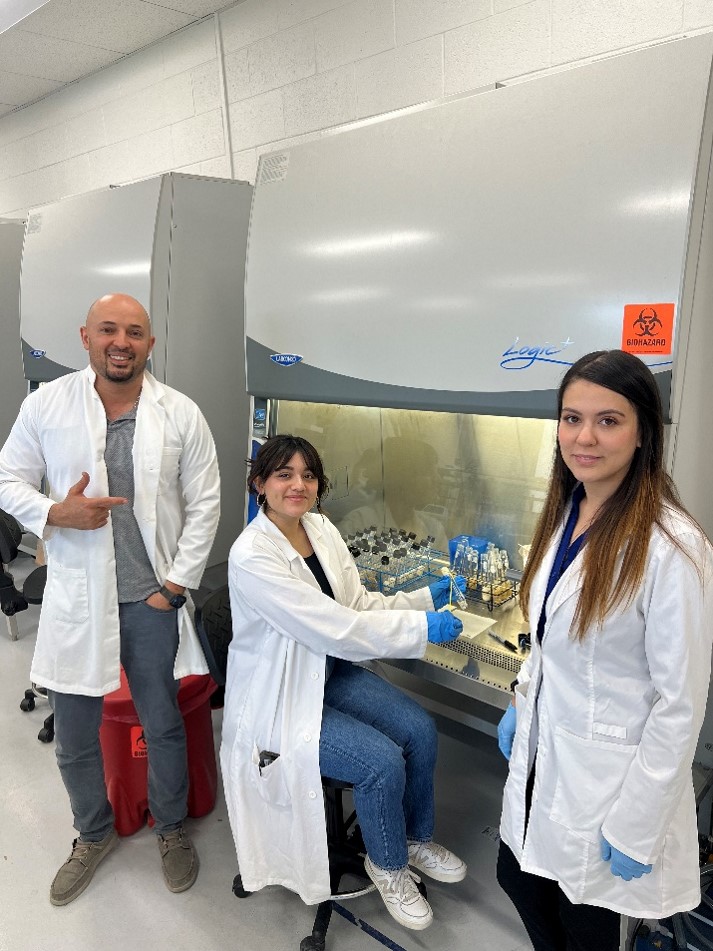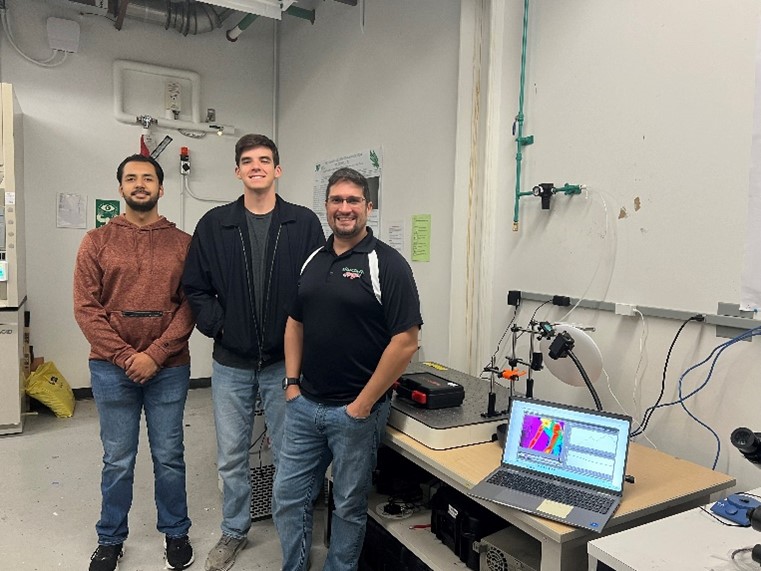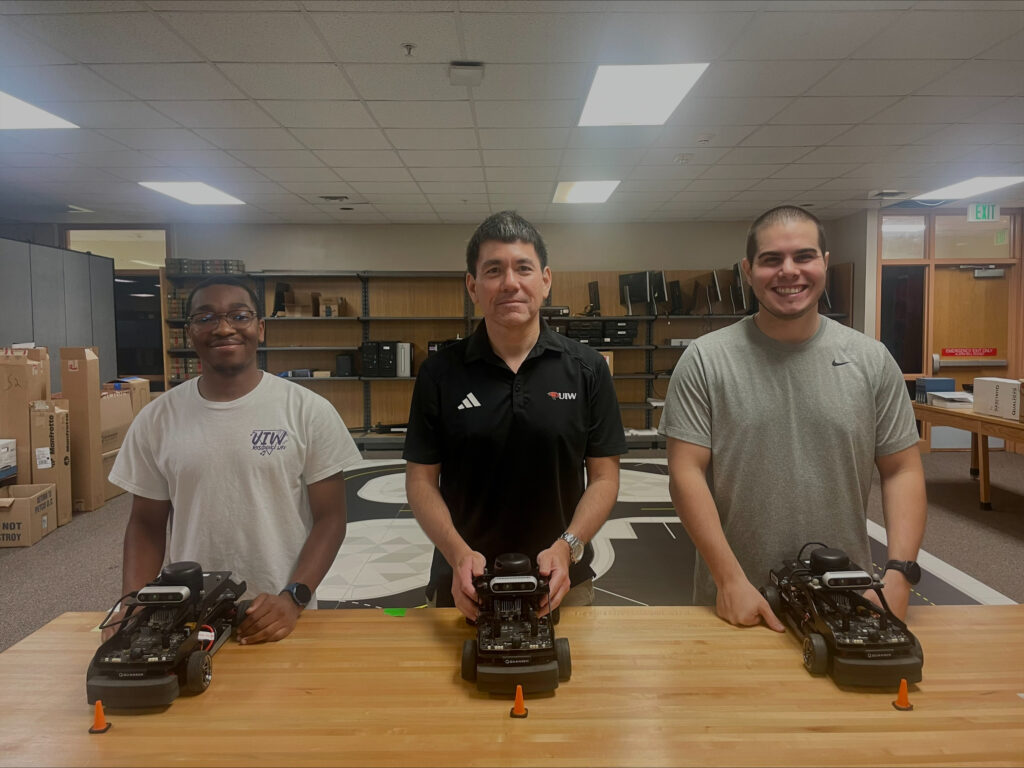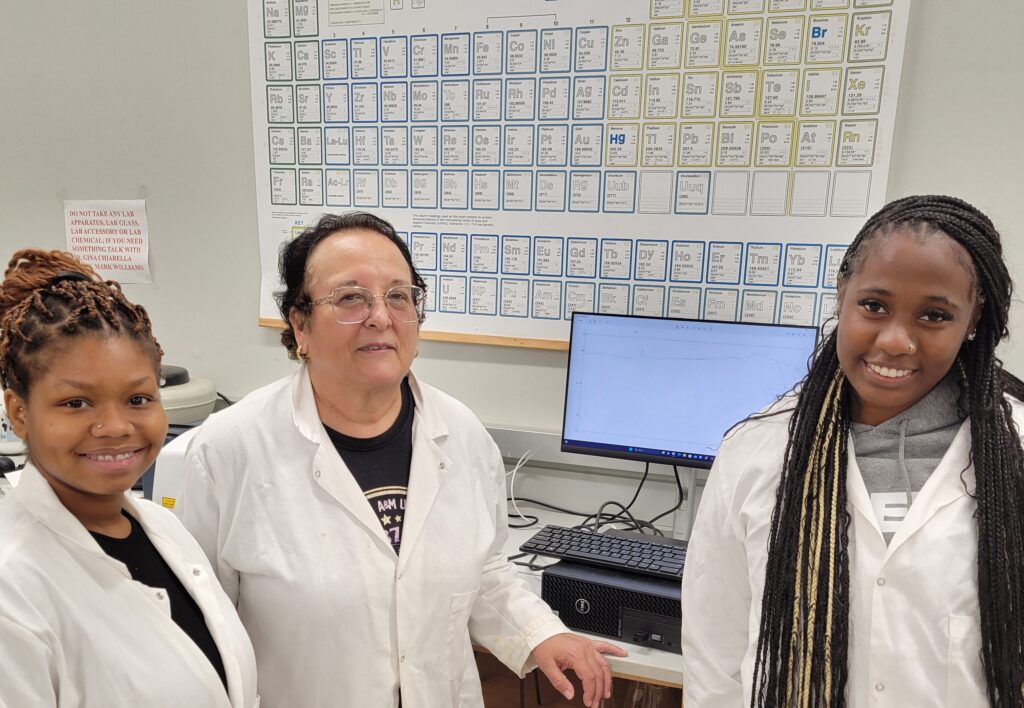The Summer Research Teams (SRT) Program is a 10-week summer research experience funded by the U.S. Department of Homeland Security (DHS). The program provides faculty and student teams from Minority-Serving Institutions (MSI) with the opportunity to conduct research through the support of one of DHS’s university-based Centers of Excellence (COE). Last year CBTS partnered with four teams, all of which applied for and received follow-on funding to extend their research:
- Efficient Detection and Identification of Small Ring Polycyclic Aromatic Hydrocarbons (PAHs) via Fluorescence Energy Transfer and GC-MS in Shrimp – Prairie View A&M University led by Harshica Fernando, Ph.D., students Naiyah McDaniel and Debra Davis
- Extending Auditability to Known and Unknown Endpoints Using Distributed Ledger Technology – City University of New York, led by Shweta Jain, Ph.D., students Rose Wong and Amy Dang
- Applying Game Theory for Improving and Optimizing the U.S. Political Asylum Process – University of North Texas, led by Michel Ph.D., student Ramkumar Santhanam
- Chemical and Biological Defense: Detecting, Protecting Against, Responding to, and Recovering from Chemical and Biological Incidents – Arizona State University, led by Kenan Song Ph.D., student Shams Hassan
This year, CBTS is working with four teams from Texas institutions. These teams will be working diligently throughout the summer and engaging with CBTS staff to complete their research projects. During the summer, students are expected to prepare and lead a weekly presentation on the work performed. Additionally, faculty members are given the opportunity to meet with each other and connect on their research. In early August, invitations to their final presentations will be made available on the CBTS website. Individuals interested in supporting student research and learning about these topics are encouraged to attend. Following the submission of their final reports, each team will be eligible to apply for $50,000 in funding to continue their efforts.
Summer 2024 SRT Cohort
University of Texas – El Paso Team:
- A Comparative Study of Rice Grains from Mexico and the USA, Assessing Nutritional Variations, Heavy Metal Presence, and Pathogen Susceptibility – University of Texas – El Paso, led by Hamidreza Sharifan, Ph.D., students Daisy Wilson and Valeria Gonzalez

Project Abstract: In this research, we explore the nutritional variations within rice grains sourced from Mexico and the USA, with a specific focus on pathogen modeling involving E. coli. Our multidisciplinary approach not only provides valuable hands-on experience to both undergraduate and graduate students but also ensures rigorous adherence to quality assurance and quality control practices. Analytical techniques encompass proximate analysis, protein, fat, and carbohydrate content assessments, as well as mineral analysis using Inductively Coupled Plasma Mass Spectrometry (ICP-MS). E. coli pathogen mode is introduced to rice grains to investigate its correlation with the rice composition. By enhancing our understanding of regional agricultural disparities and their impact on food security and quality, this study aligns with the priorities of the Department of Homeland Security and contributes to the well-being and security of our nation.
University of North Texas Team:
- Multispectral and Infrared Imaging for Cross-Border Pest Detection– University of North Texas, led by Maurizio Manzo, Ph.D., students Carson Melead and Josue Arellanes

Project Abstract: The proposed work is to use multispectral imaging and thermal imaging together to improve the detection of a selected pest (e.g., beetles, flies) into two different user case scenarios: i) beetles in rice, and ii) beetles in grass leaves. Four different illumination sources are utilized, UV, green, red, and near infrared/IR. The images are pre-processed and analyzed to find a pest index and to improve the detection of pests with high accuracy, and in a timely manner. The sensing technique can reduce the risk of invasive pests entering the US borders undetected, which can improve the food supply chains, and strengthen the nation’s economy.
University of the Incarnate Word Team:
- Autonomous Insect Detection Using Collaborative Robotic Swarms with AI – University of the Incarnate Word, led by Michael Frye, Ph.D., students George Sikazwe and Adam Gower

Project Abstract: In response to the pressing threat of invasive insect species infiltrating across our border into the US homeland’s agricultural and natural ecosystems, the AVS Lab research team proposes the development of a cutting-edge AI collaborative swarm insect detection system using autonomous ground and air vehicles. This research is directly related to the Mission of DHS and CBTS by safeguarding the border and identifying transboundary pest and disease threats (TPDT) through the development of a new and novel method using a swarm of air and ground vehicles to autonomously detect invasive species across large areas of land. This system has the benefit of decreasing the time of detection of an species. The DHS and CBTS SRT support for Summer 2024 will allow one faculty member and two undergraduate engineering students to apply the Lab’s novel AI detection system to identify invasive insects using both the Lab’s indoor SWARM Lab made up of both ground and air vehicles and the fleet of outdoor Unmanned Aircraft Systems Platforms.
Prairie View A&M University Team:
- Capturing inorganic arsenic from fertilizers by using metal complexation techniques – Prairie View A&M University, led by Gina M. Chiarella, Ph.D., students Bre’Ayshia Perry and De’Ja Toole

Project Abstract: The purpose of this project is to capture inorganic arsenic from fertilizers by complexation using iron compounds. Arsenic compounds are a major concern for DHS, which points to chemical contamination and climate change as threats. In the same way, other state and federal institutions indicated that phosphates in fertilizers are attached to arsenic compounds. The potential benefits of the outcomes of this project are the achievement of a clean and cheap technique for complex inorganic arsenic from fertilizers with a perspective of applying similar methods in water and food in future studies.
If you are interested in participating in the SRT Program for Summer 2025, more information can be found on the DHS ORISE Website with applications typically opening in the Fall.
